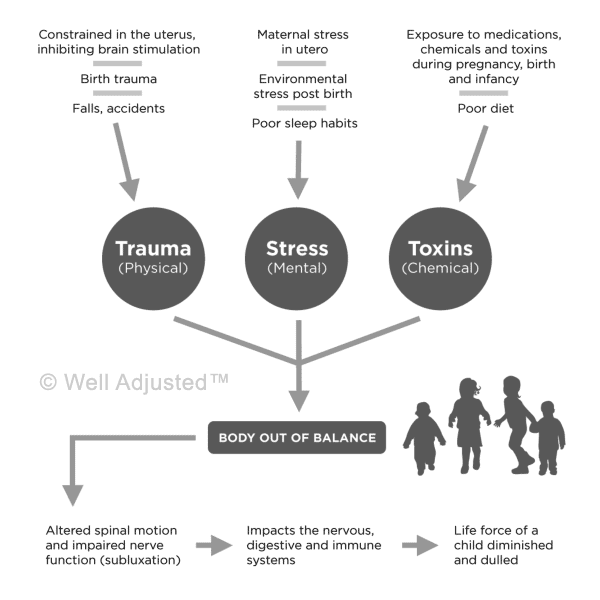|
Today's parents are special. You have to be - you are raising children in a very different world and as my mother likes to remind me, "things just aren't the way they used to be."
She's right! Just look around..... Food is injected and sprayed, water is laden with chemicals, as are the myriad of products we use, from deodorants to furniture paint to our household cleaning materials. There are many stressors in our modern day lifestyle and parents have the right to be alarmed because children are particularly vulnerable to them. From conception onwards, these stressors create a compounding effect and the result can be a child who is immune-challenged or who struggles to learn, to express themselves, to interrelate and to live in optimal health. What is Optimal Health? It is not simply a matter of 'feeling good' or being symptom free. A true indicator of health is when the body is able to effectively adapt to stressors placed on it. Yet many children today are super sized, undernourished, and over-medicated - and their bodies are clearly not coping. Pesticides, heavy metals, herbicides, and fumigants used in generic produce and products have all been linked to abnormalities in behavior, perception, cognition, and motor ability during early childhood, even when exposure is at so-called 'harmless levels'. If you feel overwhelmed by the effort needed to keep up on these health threats, the good news is that it is now easier than ever to access up-to-date information and tools to strengthen your family's health. By understanding and reducing stressors, as parents you can potentially help your children avoid illness, alleviate symptoms and encourage optimal body function for all ages of your child's life. An informed parent is an empowered parent, so here are some ideas to help your family move towards a greater quality of live. 1. Ask Good Questions The quality of your life can be determined by the quality of questions you ask. As a parent, you can usually sense when something is not quite right with your child. If you have the hunch that your baby is ill, you usually ask the question 'why?'. If your child is chronically unwell, you usually ask 'why?'. If your child's bowel aren't regular, you ask 'why?'. If your child's behavior is poor, ask 'why?'. If your child cannot concentrate, ask 'why?'. This seems obvious but often the cause of imbalance is overlooked in the haste to remedy the 'cause' with medicines. Imagine if all the fish in a lake were found to have deformities and cancerous tumors... how would biologists and wildlife experts tackle this issue? Do you think they would cut out the tumors and dose the fish with medication? Of course not. That would be illogical. Instead, they would ask 'WHY?'. They would look at the ecosystem and consider the factors that could have created the ill health of the fish, and they would set out to eradicate the factors and create a solution that offers future PREVENTION. Now imagine a child who behaves aggressively; how would health experts tackle this problem? Is it logical to offer him/her medication for behavioral issues? Or should they be looking at the food he/she is eating - foods that lack nutrition and life, and that are toxic with additives and preservatives? Or the fact that he is dehydrated? Or that he/she is over-stimulated by electronic gadgets and computers, or hardly ever raises a sweat outside or breathes fresh air? Drugs are not always the answer. Collectively we are more reliant on medication than ever before. I believe we need to remember that we can take charge of our health by empowering ourselves with knowledge and awareness. We can commit to asking a few good questions and seeking logical answers and solutions to our (and your child's) health issue. In doing so, we will be better enabled to navigate our family's health and well-being. 2. Educate your Children about their Own Bodies Kids are fascinated with how the body works. From an early age make learning about the body fun. There are plenty of books, DVDs and websites that add visual impact. When kids learn how their body works and how to care for it, they also learn how to listen and respect it. In our 'quick-fix' society, children are often given the message that when they are sick, they need medicine. However, if they are taught that health comes form within and that their bodies have a tremendous intelligence and capacity to ward off illness, then early warning signs like a runny nose or a sore throat will not be seen as a sign to take antibiotics, but as an indication that they need to slow down, get lots of rest and boost their immunity with natural foods. 3. Look for Signs of a Body out of Balance As a parent it is important that you observe your children to see that they are integrating their world in age-appropriate ways. An imbalance can indicate in many way. For example, a baby may cry or fuss during feeding and arch her back, her head may be unevenly shaped, or she may not like lying on her tummy. Becoming familiar with the expected developmental milestones will help you assess whether your child's behavior is problematic or not. For older children, some warning signs of a body out of balance may be... Slow recovery from minor illnesses or recurring colds, flus and allergies Poor balance and coordination Inability to concentrate Agitation, anxiety Over-sensitivity to environmental noises Eczema, pale skin, discoloration under their eyes Bloated tummy, constipation Hyperactivity Defiant or angry behavior Consistently low mood, lake of enthusiasm Difficulty sleeping Fatigue upon waking, general sluggishness The human body gives us many indicators that it is not able to handle the stressors placed upon it. Symptoms are a message from our body that there is a problem and that change is needed.
1 Comment
8/29/2016 12:46:15 pm
It's actually a cool and useful piece of information. I'm happy that you simply shared this helpful information with us. Please stay us up to date like this. Thanks for sharing.
Reply
Leave a Reply. |
blogRead our posts and join the conversation by commenting or sharing with community. categories
All
archives
October 2023
|
Elkhorn WIhoursMONDAY: 2-6
TUESDAY: 9-12 + 3-7 WEDNESDAY: 2-6 THURSDAY: 3-7 FRIDAY: 9-12 SATURDAY: 9-12 |
Johnson Creek WIhoursMONDAY: 2-6
TUESDAY: 2-6 WEDNESDAY: 2-6 THURSDAY: CLOSED FRIDAY: 2-6 SATURDAY: CLOSED |
subscribe to our emails |



 RSS Feed
RSS Feed